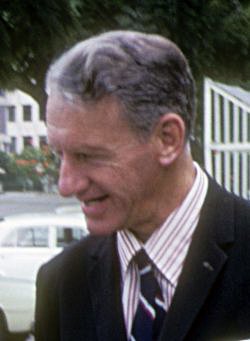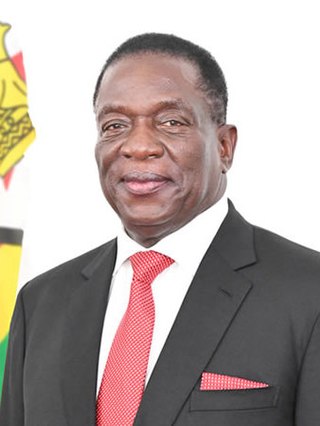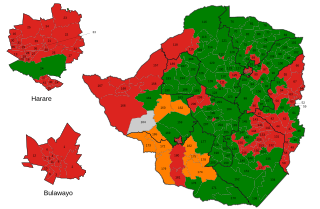Until roughly 2,000 years ago, what would become Zimbabwe was populated by ancestors of the San people. Bantu inhabitants of the region arrived and developed ceramic production in the area. A series of trading empires emerged, including the Kingdom of Mapungubwe and Kingdom of Zimbabwe. In the 1880s, the British South Africa Company began its activities in the region, leading to the colonial era in Southern Rhodesia.

Ian Douglas Smith was a Rhodesian politician, farmer, and fighter pilot who served as Prime Minister of Rhodesia from 1964 to 1979. He was the country's first premier born and raised in Rhodesia, and led the predominantly white government that declared independence from the United Kingdom in November 1965 following a prolonged dispute with the British government, which demanded black majority rule as a condition for independence. Smith remained Prime Minister for almost all of the 14 years of international isolation that followed for the unrecognised state, and he oversaw Rhodesia's security forces during most of the Bush War, which pitted the government against communist-funded black nationalist fighters. Smith remains a highly controversial figure.

The Zimbabwe African National Union – Patriotic Front (ZANU–PF) is a political organisation which has been the ruling party of Zimbabwe since independence in 1980. The party was led for many years under Robert Mugabe, first as prime minister with the Zimbabwe African National Union (ZANU) and then as president from 1987 after the merger with the Zimbabwe African People's Union (ZAPU) and retaining the name ZANU–PF, until 2017, when he was removed as leader.

Joshua Mqabuko Nyongolo Nkomo was a Zimbabwean revolutionary and politician who served as Vice-President of Zimbabwe from 1990 until his death in 1999. He founded and led the Zimbabwe African People's Union (ZAPU) from 1961 until it merged in 1987 with Robert Mugabe's Zimbabwe African National Union (ZANU) to form ZANU–PF after an internal military crackdown called Gukurahundi in western Zimbabwe, mostly on ethnic Ndebele ZAPU supporters.
Jonathan Nathaniel Mlevu Moyo is a Zimbabwean politician who served in the government of Zimbabwe as Minister of Higher Education from 2015 to 2017. He was previously Minister of Information and Publicity from 2000 to 2005 and again from 2013 to 2015. He was elected to the House of Assembly of Zimbabwe as an independent candidate in 2005 and 2008. He is considered the core architect of the AIPPA and POSA restrictive legislation.

Parliamentary elections were held in Zimbabwe on 31 March 2005 to elect members to the Zimbabwe House of Assembly. All of the 120 elected seats in the 150-seat House of Assembly were up for election.
Margaret Dongo is a Zimbabwean politician known for speaking in favor of women's rights and out against corruption. She was an ex-combatant of the 1970s liberation war, served in parliament, and helped establish the Zimbabwe Union of Democrats (ZUD).
Gibson Jama Sibanda was a Zimbabwean politician and trade unionist. He was a founding member of the Movement for Democratic Change and at the time of his death was the Vice-President of the faction of the Movement for Democratic Change led by Arthur Mutambara. A former president of the Zimbabwe Congress of Trade Unions, he was first elected to the House of Assembly in the 2000 parliamentary election. He was a member of the Senate and a Minister of State in the Office of Deputy Prime Minister Arthur Mutambara at the time of his death in 2010.

Emmerson Dambudzo Mnangagwa is a Zimbabwean politician who has served as President of Zimbabwe since 24 November 2017. A member of ZANU–PF and a longtime ally of former President Robert Mugabe, he held a series of cabinet portfolios and was Mugabe's Vice-President until November 2017, when he was dismissed before coming to power in a coup d'état. He secured his first full term as president in the disputed 2018 general election. Mnangagwa has been re-elected in 2023 with 52.6% of the votes. Nelson Chamisa came in second with 44%.
Sydney Tigere Sekeramayi is a Zimbabwean politician who served in the government of Zimbabwe as Minister of Defence between 2013 and 2017. He has been a minister in the Cabinet since independence in 1980, serving as Minister of Defence from 2001 to 2009 and Minister of State Security from 2009 to 2013.

Didymus Noel Edwin Mutasa is a Zimbabwean politician who served as Zimbabwe's Speaker of Parliament from 1980 to 1990. Subsequently, he held various ministerial posts working under President Robert Mugabe in the President's Office. He was Minister of State for Presidential Affairs from 2009 to 2014 and also served as ZANU-PF's Secretary for Administration.
Zimbabwe began experiencing a period of considerable political and economic upheaval in 1999. Opposition to President Mugabe and the ZANU-PF government grew considerably after the mid-1990s in part due to worsening economic and human rights conditions. The Movement for Democratic Change (MDC) was established in September 1999 as an opposition party founded by trade unionist Morgan Tsvangirai.
Ambrose Mutinhiri is a Zimbabwean politician, formally served as the Minister of Youth Development and Employment Creation. A retired army commander and brigadier, he was appointed as Minister of Youth Development, Gender and Employment Creation on February 9, 2004. He was trained in Russia during the Rhodesian Bush War. He is known for training the best calibre of soldiers during this period, even the late General Solomon Mujuru testified that he was trained by Mutinhiri.
Webster Kotiwani Shamu is a Zimbabwean politician and former Minister of Mashonaland West Provincial Affairs who was fired by President Emmerson Mnangagwa on 21 May 2018. He previously served as Minister of Information and Publicity, and as Minister of State for Policy Implementation. He is a member of parliament representing the Chegutu constituency. The Cabinet of Zimbabwe was later dissolved on 27 November 2017.
Joseph Chinotimba is a Zimbabwean political figure. He rose to prominence during the invasions of white-owned commercial farms that started after the 2000 constitutional referendum in Zimbabwe. He is widely regarded as a militant ZANU-PF cadre with unquestionable allegiance to the old guard of the ruling party. He is the national vice-chairman of the Zimbabwe National Liberation War Veterans Association.
Campaigning for the first round of the presidential election held in Zimbabwe on 29 March 2008 took place from February to March. There were three major candidates: President Robert Mugabe of the ruling Zimbabwe African National Union - Patriotic Front (ZANU-PF), Morgan Tsvangirai of the opposition Movement for Democratic Change, and the independent candidate Simba Makoni.

Robert Gabriel Mugabe was a Zimbabwean revolutionary and politician who served as Prime Minister of Zimbabwe from 1980 to 1987 and then as President from 1987 to 2017. He served as Leader of the Zimbabwe African National Union (ZANU) from 1975 to 1980 and led its successor political party, the ZANU – Patriotic Front (ZANU–PF), from 1980 to 2017. Ideologically an African nationalist, during the 1970s and 1980s he identified as a Marxist–Leninist, and as a socialist after the 1990s.

The Movement for Democratic Change (MDC) was a Zimbabwean political party organised under the leadership of Morgan Tsvangirai. The MDC was formed in 1999 as an opposition party to President Robert Mugabe's Zimbabwe African National Union – Patriotic Front (Zanu-PF). The MDC was made up of many civic groups who campaigned for the "No" vote in the 2000 constitutional referendum, which would limit a president's service to two terms, before the introduction of a prime minister, as well as giving legal immunities to the state.

General elections were held in Zimbabwe on 31 July 2013. Incumbent President Robert Mugabe was re-elected, whilst his ZANU–PF party won a two-thirds majority in the National Assembly.

General elections were held in Zimbabwe on 29 March 2008 to elect the President and Parliament. Because of Zimbabwe's dire economic situation, the elections were expected to provide incumbent President Robert Mugabe with his toughest electoral challenge to date. Mugabe's opponents were critical of the handling of the electoral process, and the government was accused of planning to rig the election. Human Rights Watch said that the election was likely to be "deeply flawed."









